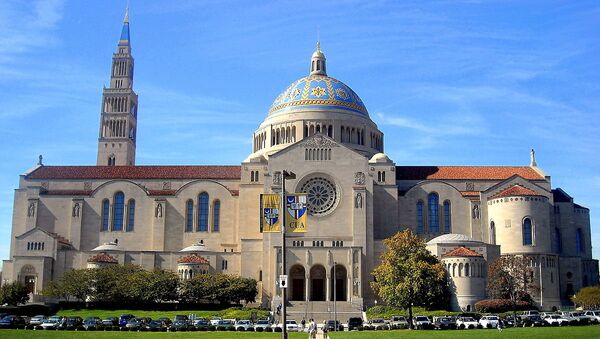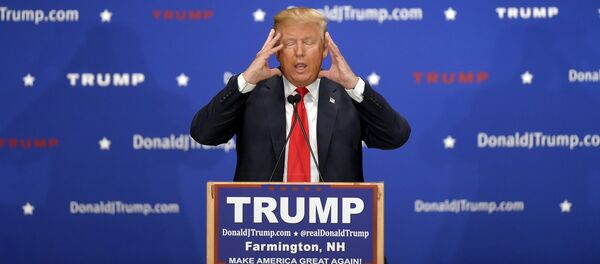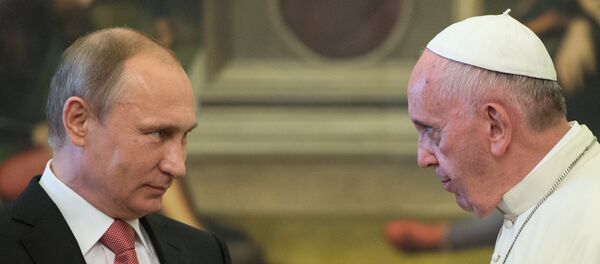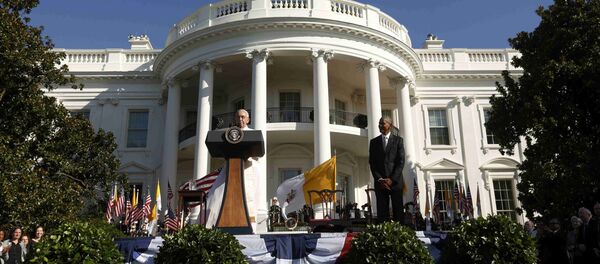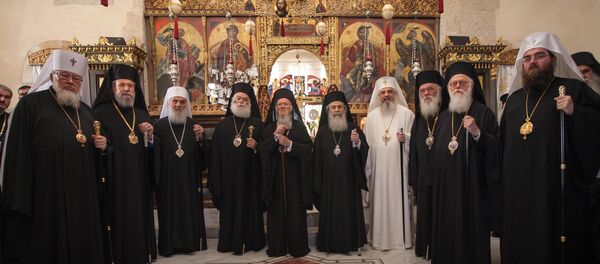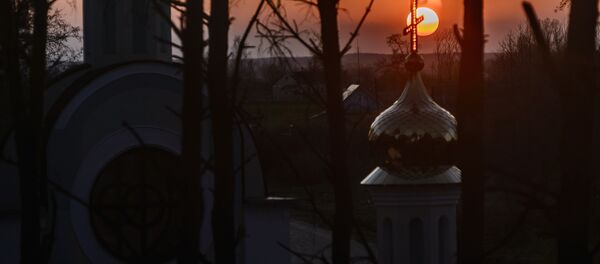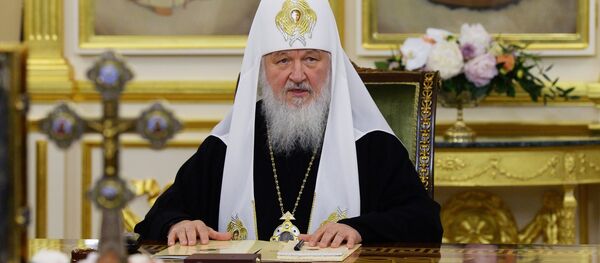MOSCOW (Sputnik) — Religion has always played a vital role in different aspects of social life. Although its designated sphere is that of morality, its influence on political and social life is undeniable, with religious leaders commenting on current events and often playing a reconciliatory or advisory role.
The year of 2016 has been no exception. Religion has left its mark on some of the key events of the year, and religious figures have commented on everything from the dangers of climate change, to the US presidential elections.
WEIGHING IN ON THE US PRESIDENTIAL ELECTIONS
The role of religion in the United States politics, and particularly in the popularity of a candidate during an election process, whether regional or national, cannot be underestimated — candidates must publicly embrace faith if they want to win. Unease about Mitt Romney’s Mormonism persisted among liberals and conservatives in 2012, and Barack Obama’s affiliation with Christianity was questioned in 2008. In 2016, the US presidential elections took center stage in all spheres of life.
In the months leading up to the election, US media suggested that there was a religious split in voter trends. A Pew Research Center survey, conducted in June showed that Republican Hillary Clinton was enjoying popularity among Latino Catholics, with 77 percent saying they would vote for or lean toward voting for Clinton. The poll also showed that 89 percent of black Protestants said they would vote for Clinton, as would two-thirds of those with no religious affiliation. Meanwhile approximately eight-in-ten white evangelical Protestant voters would support Trump. Voters who said they attend religious services at least once a week were found to be fairly evenly split: 49 percent would vote for Trump and 45 percent for Clinton.
Among the polls other findings, was the fact that only 46 percent of Catholics named abortion as an important deciding factor in choosing who to vote for, while issues such as economy and terrorism garnered over 80 percent.
In the run-up, international leaders, social activists and the media weighed in with their opinions and their desired outcome. The leader of the Catholic Church Pope Francis’s general stance supported the "sovereign" people and left them to "study the proposals well, pray, and choose in conscience." However, in an unprecedented remark on a central issue in a US presidential campaign, the Pope explicitly criticized Trump on plans to build a wall to separate the United States and Mexico. "A person who thinks only about building walls, wherever they may be, and not building bridges, is not Christian," the Pope stated in February. Trump criticized the Pope’s visit to Mexico, calling him "a very political person," and adding that the Mexican government is "using the pope as a pawn."
The pontiff also commented on the political situation in the United States in general, stressing that "when in any country there are two, three or four candidates who don't satisfy everyone, it means that perhaps the political life of that country has become too politicized and that it does not have much political culture."
RELIGION’S PLACE IN THE SPHERE OF INTERNATIONAL RELATIONS
Pope Francis has weighed in on a number of international conflicts over the year. In April, Turkey recalled its ambassador from the Vatican after Pope Francis referred to the killings of Armenians during World War I as "the first genocide of the 20th century." The Turkish Deputy Prime Minister Nurettin Canikli, reportedly said the Pope had a "crusader mentality." The accusation that was denied by Director of the Holy See Press Office Federico Lombardi, who described the Pope’s mission with regard to the two countries as one of reconciliation.
In May, Cuban leader Raul Castro thanked Pope Francis "for his contribution to the restoration of relations between Cuba and the United States." The historic warming of Cuba-US relations, dubbed the Cuban Thaw, began in December 2014 as the two countries look to reopen respective embassies in Havana and Washington for the first time in more than 50 years.
The historic meeting between head of the Roman Catholic Church Pope Francis and head of the Russian Orthodox Church Patriarch Kirill of Moscow and All Russia, which took place on February 12, set an important precedent for future progress in relations, not only between the two religious denominations but, between Russia and the West. The leaders met at Havana’s Jose Marti International Airport, in a meeting that marked the first time a Catholic pope and an Orthodox patriarch have met since Christianity split into Western and Eastern branches in 1054. The meeting and the declaration, are hoped to "contribute to the re-establishment of this unity [between Catholics and Orthodox] willed by God, for which Christ prayed," Pope Francis and Patriarch Kirill said in the joint declaration.
The declaration covered a number of politically and socially important issues, including the Middle East, the conflict in Ukraine, traditional family values and the renewal of Christianity in Russia and Eastern Europe. Speaking of the meeting and declaration, Alexander Volkov, the patriarch’s press secretary said that "relations will undoubtedly develop — we really hope it will happen — only in a positive way."
With regard to Ukraine, a topic that had been a bone of contention between the two leaders, and indeed between Russia and Europe, they invited "all the parts involved in the conflict to prudence, to social solidarity and to action aimed at constructing peace." The joint declaration deplored "hostility" in Ukraine, but omitted mention of Russia’s alleged role.
However, such involvement of religious leaders on the political scene comes with consequences. The declaration of Pope Francis and Patriarch Kirill, especially, has stirred controversy, with Western media widely condemning the move on the basis that the pontiff had inadvertently condoned Russia’s actions in Ukraine by not explicitly condemning them. Archbishop Sviatoslav Shevchuk, major archbishop of Kiev-Halych and the head of the Ukrainian Greek Catholic Church, commented that the "text has caused deep disappointment among many faithful of our church and among conscientious citizens of Ukraine … they feel betrayed by the Vatican, disappointed by the half-truth nature of this document, and even see it as indirect support by the Apostolic See for Russian aggression against Ukraine," as cited by the Catholic Herald.
More recently, the Catholic Church demonstrated its support of those affected by the Ukrainian conflict, when the Pontifical Council Cor Unum announced that the Catholic leader would donate almost 6 million euros ($6.27 million) as humanitarian aid to the residents of eastern Ukraine as a Christmas gift.
THE SIN OF CLIMATE CHANGE
The Pope has for some time been known as a major advocate of policy change regarding the climate. In 2015, the Pope warned of the "alarming warming" that threatens humanity and the environment in a 184-page encyclical called Laudato Si (Be Praised) and called for an urgent reduction of global carbon emissions and encouraged the use of renewable energy sources.
This year, in a message to mark the Catholic Church’s World Day of Prayer for the Care of Creation, Francis stressed that climate change was affecting the poor and contributing to the large scale refugee crisis. "The world’s poor, though least responsible for climate change, are most vulnerable and already suffering its impact," he stated. Quoting the Ecumenical Patriarch Bartholomew, he added that "to commit a crime against the natural world is a sin against ourselves and a sin against God."
He urged care for the environment to be added to the seven spiritual works of mercy outlined in the Gospel that the faithful are asked to perform throughout the pope’s year of mercy in 2016.
The pontiff’s views differ from those of many US Republicans, who deny the scientific evidence supporting climate change and the moral urgency to take swift action.
THE HOLY AND THE GREAT COUNCIL OF THE ORTHODOX CHURCH
The Holy and Great Council of the Orthodox Church was perhaps the most noteworthy religious event of the year. The Holy and Great Council of the Orthodox Church, also known as the Pan-Orthodox Council, was held on the Greek island of Crete on June 16-27 after over five decades of preparations. The event was set to become the first meeting of the heads all the Orthodox churches in more than 1,000 years.
Of the 14 national Orthodox churches, four refused to attend the event arranged by the Greek Orthodox Archdiocese of America, including the Patriarchate of the Russian Orthodox Church, the Georgian and Bulgarian Orthodox Churches, as well as the Greek Orthodox Patriarchate of Antioch and All the East. The Serbian Church, which had insisted on postponing the Council, eventually decided to send a delegation to the meeting. The Holy Synod of the Russian Orthodox Church has declared the council of Orthodox churches in Greece an important event, but clarified that documents adopted there cannot be seen as pan-Orthodox.
At the beginning of June, the Russian Orthodox Church said that holding the Pan-Orthodox Council without a preliminary extraordinary meeting to reconcile all the existing differences was unrealistic and that it would discuss the legitimacy of the decisions to be made at the Council, if a bishops' synod were to be held. However, according to a representative of the Constantinople Patriarchate the Pan-Orthodox Council in Crete could not be canceled and its status could not be changed without the approval of all 14 churches.
Despite the fact that a number of churches refused to participate in it, Metropolitan Sawa, the leader of the Polish Orthodox Church, said that pan-Orthodox unity was not affected.
The budget of the Council amounted to 2.5 million euros (some $2.8 million), including $1.5 million from US donors, mostly of Greek origin. According to Reverend Father Alexandros Karloutsos, an assistant to the archbishop for public affairs of the Greek Orthodox Archdiocese of America, the US funds came from non-state sources only, and the US government was not involved in either the organizing or in the financing of the Council.
During the gathering, the Council voiced the opinion of the Eastern Orthodoxy on key social issues, including marriage, ecology and war. In its final address, the Council reflected on the unity of the Orthodox church and added that the Orthodox Church intends to maintain dialogue with other churches and this would not be a betrayal of faith.
RELIGIOUS INFLUENCE ON MORAL AND SOCIAL ISSUES
Alongside their involvement in international relations and developments, religious leaders worldwide have continued to promote the issues closest to their spheres of influence. Christians have continued to be persecuted worldwide, with foreign leaders, as well as those of different religious denominations condemning the acts carried out against their followers. On June 10, Russian President Vladimir Putin and Pope Francis voiced their concern about the Christians that suffer from violence in the Islamist-controlled areas in the Middle East. According to Putin’s spokesman Dmitry Peskov both sides noted that threat to Christian lives was "a crisis situation."
Pope Francis has also noted the internationally significant and pressing problem of the immigration crisis, with hundreds of thousands of people leaving conflict-torn countries in the Middle East and North Africa to escape violence and poverty and seeking asylum in Europe. The Pope, who last year called on European parishes and monasteries to give shelter to refugee families, continued to admonish the treatment of refugees and those experiencing displacement. In April he visited the refugee camp on Greece’s island of Lesbos and met hundreds of refugees housed there. During the visit, the pontiff emphasized that "we are heading for a meeting with the worst humanitarian disaster since the Second World War." Along with two Eastern Orthodox leaders, the Catholic leader released a statement, in which they urged the international community must step up efforts at achieving consensus on an assistance program, the declaration said, adding that this is required to protect minorities, tackle human trafficking, eliminate unsafe routes across the Mediterranean and conduct resettlement programs. The Pope’s influence on political discourse on the matter has been evident. Wladyslaw Kosiniak-Kamysz, the leader of the Polish People's Party (PSL), for example, stated that "for humanitarian reasons we must accept women and children if it is necessary; the Holy Father [Pope Francis] also calls for that."
Pope Francis took a more lenient approach to the use of contraception, especially in event of necessity and danger to exposure to viruses such as the Zika virus. "Avoiding pregnancy is not an absolute evil," Francis said. "In certain cases, as in this one, as in that one I mentioned of Blessed Paul VI, it was clear. I would also urge doctors to do their utmost to find vaccines against these mosquitoes that carry this disease," he said during a conference on board the papal airliner in February. The church has long opposed the use of artificial contraceptives, a ban reaffirmed by Paul VI in his 1968 papal encyclical, Humanae Vitae.

